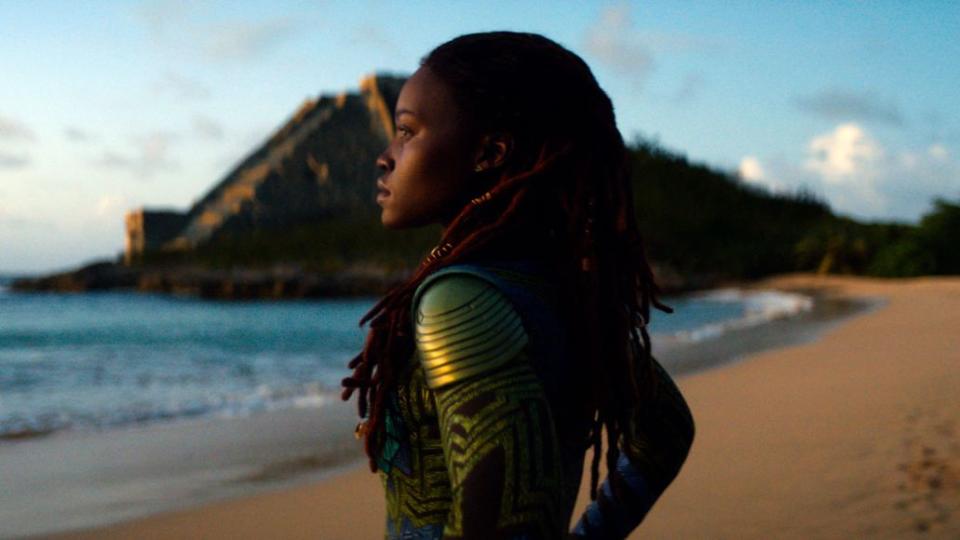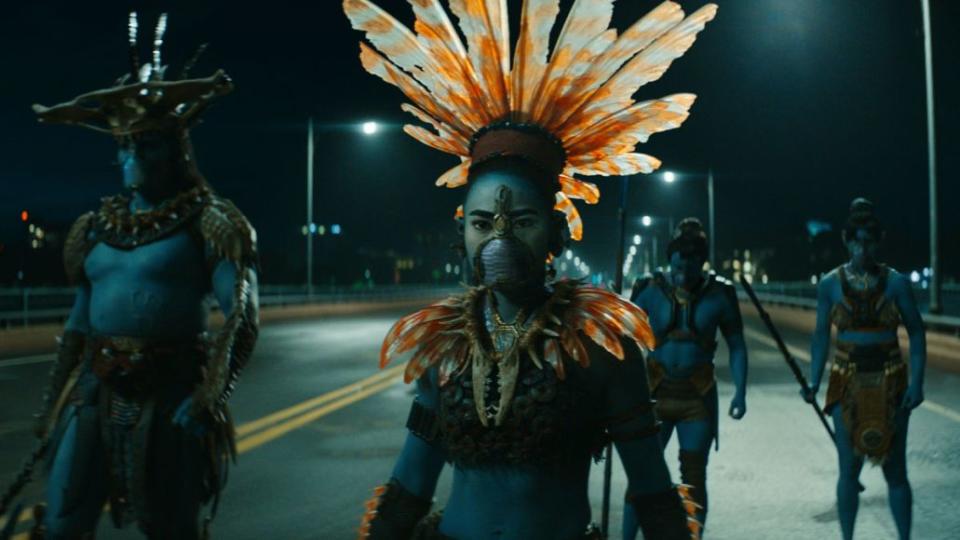Black Panther: Wakanda Forever Review: A Superhero Film About the Very Human Need to Grieve
- Oops!Something went wrong.Please try again later.
- Oops!Something went wrong.Please try again later.
- Oops!Something went wrong.Please try again later.
- Oops!Something went wrong.Please try again later.
The post Black Panther: Wakanda Forever Review: A Superhero Film About the Very Human Need to Grieve appeared first on Consequence.
The Pitch: Rest in power, King T’Challa, and Chadwick Boseman. Black Panther: Wakanda Forever begins by immediately delving into the loss of the Wakandan leader and superhero, but the character’s death from an unspecified illness is hardly a prologue — it is the foundation upon which writer/director Ryan Coogler and co-writer Joe Robert Cole build the highly anticipated sequel to the first (and only) MCU movie to be nominated for Best Picture at the Oscars.
The loss of T’Challa is gutting for everyone but most especially his sister, Shuri (Letitia Wright), who had turned to science for a potential answer to saving him but failed. Also, thanks to Killmonger (Michael B. Jordan) burning the Wakandan supply of the heart-shaped herb in the first film, there is no new Black Panther to inherit the powers and the mantle.
A year after his passing, the wounds still haven’t fully healed, but life moves on, as it inevitably must — thus, Wakanda finds itself facing a new international challenge, tied to the country’s perceived dominion over vibranium, a natural element that other countries of the world (not to mention more ruthless entities) would like to also get their hands on.
While Wakanda is fiercely committed to protecting its own supply (and thanks to the Dora Milaje, is more than able to defend itself and its vibranium supply), it turns out they’re not the only secretive world power with a vested interest in the material — and Namor (Tenoch Huerta), ruler of the underwater kingdom Talokan, is determined to protect his people from outside threats to their own supply…
Bring Kleenex: The announced runtime of Wakanda Forever is 161 minutes, which is, y’know, not short. But once you consider all the various elements involved, especially the creation of a new and noteworthy anti-hero with a rich backstory, not to mention also introducing a supporting character whose own Disney+ series is due to arrive next year, it makes sense.
For while there’s also some action along with the elements mentioned above, Wakanda Forever first and foremost is a film about grief — which is extremely fitting for a movie that, in another and perhaps better timeline, would have starred the man who led the original film to both box office and awards glory. There’s fun to be had along the way, especially centered around newcomer Dominique Thorne as Ironheart-to-be Riri Williams. But thanks to that extra screen time, Coogler doesn’t have to shortchange the emotional journey of his characters, who mourn with us.

Black Panther: Wakanda Forever (Disney)
Black Women in the Lead: From early looks at the film, it was hard to say who would be the focus of Wakanda Forever; while Boseman was without question the star of the first film, one of the film’s best qualities was the creation of a robust ensemble, featuring a chorus of actors who all could (and have since) easily lead their own films.
But Wakanda Forever is really Shuri’s story, and an opportunity for Wright to prove her powers as a compelling screen presence. In the first Black Panther, as well as subsequent MCU appearances, the character largely served as comic relief/Q from James Bond, but here she gets to dig deep into both the pain of loss as well as the rage that comes with realizing just how unjust death can be.
Still, the ensemble remains strong and vibrant here, with Nakia (Lupita Nyong’o) returning to play a significant role, and Okoye (Danai Gurira) stepping up to anchor a number of the biggest action moments. Between Wright, Nyong’o, Gurira, the charming Thorne, and the forever awe-inspiring Angela Bassett, there are large portions of the film which are just amazing Black women working together on science and superhero stuff. It’s remarkable not just for the amount of representation on screen, but how organic and matter-of-fact it feels.
That Said… If there’s one plot misstep, it’s the inclusion of Riri; Thorne is game and great and her bright energy comes in just as things were beginning to feel a little too heavy. But the plot machinations involved in making that happen lead to her introduction into the narrative feeling a bit forced (if only due to the meta-knowledge that she’s here to service the demands of the ever-expanding MCU, not necessarily the needs of the plot).
Also, Wakanda Forever is definitely not lacking in action sequences, with one big battle on a Boston bridge, midway through the film, perhaps being the highlight. But if you’re hoping for non-stop big fights, this isn’t that movie. (Which is ultimately to the film’s benefit, but might frustrate some.)
Meanwhile — one more film before it’s officially a trend — the Black Panther movies are so far two-for-two when it comes to crafting compelling anti-heroes who drive the plot forward but also bring with them their own fascinating story. And Namor is perhaps even easier to relate to than Killmonger, as a man whose fantastical superpowers and rich origin all combine for an auspicious MCU debut. (And likely not his last appearance.)

Black Panther: Wakanda Forever (Disney)
It certainly doesn’t hurt that Huerta, previously seen in projects including Narcos: Mexico and The Forever Purge, is magnetic in the role, an imposing physical presence but not without nuance and vulnerability. And Talokan, as depicted here, is packed with fascinating details — Coogler already showed his ability to create believable new worlds within the MCU in the first film, but this proves him to be a master at this beyond the creation of Wakanda.
Also, the cinematography by Autumn Durald Arkapaw is lush with color and texture, whether deep in the ocean or on land. (Also, one Oscar nomination you can bank on: the legendary Ruth E. Carter, who previously won for the costumes in the first film, and tackles the new challenges of this film with equally stunning effect.)
The Verdict: For years to come, the vision of what a Black Panther sequel would be had Boseman not passed away will haunt us. But Wakanda Forever successfully makes the case for why recasting the role and proceeding as if nothing had happened would have been the wrong one.
The choice for T’Challa’s death to not be the film’s only significant loss weighs the film down a bit, but does connect to the themes of learning to cope with loss, and also learning how to move on — big and bold topics which aren’t foreign to this genre, but have rarely, if ever, been addressed with such power and grace. You can feel everyone involved with this production processing their grief for their fallen brother, and the result does prove to be cathartic. Death may be inevitable, but may all of us be so lucky as to be so lovingly remembered by those we leave behind.
Where to Watch: Black Panther: Wakanda Forever is in theaters beginning Friday, November 11th.
Trailer:
Black Panther: Wakanda Forever Review: A Superhero Film About the Very Human Need to Grieve
Liz Shannon Miller
Popular Posts
Lorde: "Touring Has Become a Demented Struggle to Break Even or Face Debt"
Rick Ross Denies Being Hoarder While Showing Off Mansion Filled with Clothes and Shoes
Joe Walsh on Honoring Taylor Hawkins, Reuniting James Gang, and Learning From Pete Townshend
Hozier on His New Song for God of War: Ragnarök, "Blood Upon the Snow": Exclusive

